Modi's Christmas gift to Sharif
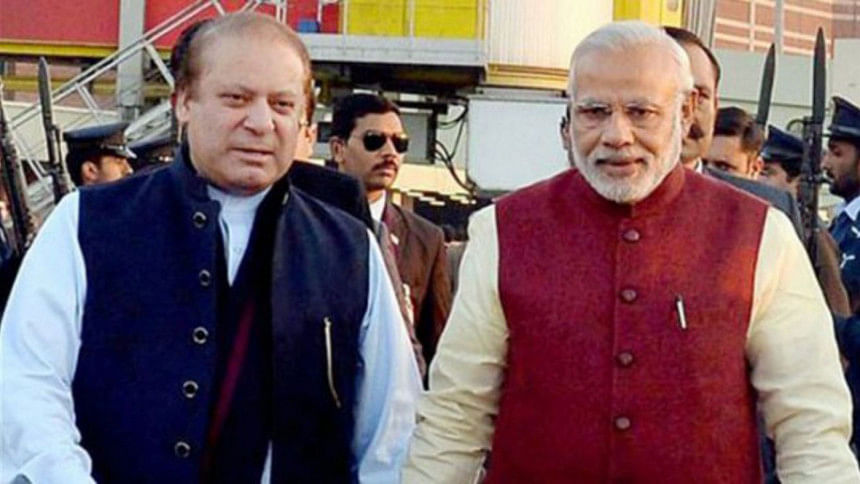
One is too familiar with the complicated love-hate relationship between India and Pakistan. But over the past three weeks, some dramatic developments have taken place between these two countries.
Indian Prime Minister Narendra Modi, after his official visit to Russia, flew to Kabul to inaugurate the new India-built Afghan Parliament building on December 25, 2015. From Kabul, on his way to Delhi, Modi stopped off in Lahore to meet Pakistan Prime Minister Nawaz Sharif the same day before returing to Delhi after a couple of hours. The two leaders discussed bilateral issues, including Kashmir and cross-border terrorism.
Modi had apparently called Sharif earlier in the day to wish him on his 66th birthday, when Sharif requested him to stop over in Lahore for lunch. Modi accepted the invitation and Sharif received Modi at Lahore airport and then took him to his Raiwind residence. It was described as a spontaneous goodwill visit.
The news of Modi visiting Lahore has caught the senior officials, political parties and the media of both countries by surprise. The media in Pakistan welcomed the visit of Modi while also reacting with caution. Pakistan's Peoples Party Chairman Bilawal Bhutto Zardari and Tehreek-e-Insaaf Chief Imran Khan welcomed Modi's visit to Pakistan. But in India, an acrimonious debate started about Modi's unorthodox diplomatic overture to Pakistan.
When Narendra Modi became Prime Minister of India, he invited Nawaz Sharif to his swearing-in ceremony in May 2014. The Modi-Sharif bonhomie there was wasted, however, when fierce shootings across the LoC in Kashmir killed several soldiers on both sides in July 2014. The army chiefs of these two nuclear armed countries threatened each other of serious consequences.
As tensions persisted, both leaders went to New York for the United Nations General Assembly in September 2014, but they did not even exchange courtesies, as Nawaz Sharif raised the Kashmir issue at the General Assembly. Later, the two men met in November 2014 in Kathmandu for the SAARC Summit amidst high drama.
At the Shanghai Cooperation Organisation meeting in Russia in July 2015, Modi and Nawaz met on the sidelines and issued a statement with both leaders condemning terrorism and agreeing to eliminate it. They agreed that the National Security Advisors of both countries should meet to discuss all terrorism related issues. Pakistan finally accepted that terrorism was a reality and had to be eliminated. Since the terrorist attack in Mumbai in November 2008, India has changed its terms of reference for engaging Pakistan. There was no mention of Kashmir in the statement.
After 18 months of the stop-and-start drama, an important diplomatic contact between the two countries took place in Bangkok on December 6, 2015 when the National Security Advisor of Pakistan Gen (retd) Nasir Khan Janjua met his Indian counterpart Ajit Doval. The meeting discussed "peace and security, terrorism, Jammu and Kashmir, and other issues, including tranquillity along the LoC." Bangkok was chosen because India had earlier cancelled the visit of Janjua to Delhi as he wanted to meet Kashmir separatist leaders of Hurriyat.
Soon after the Bangkok meeting, External Affairs Minister Sushma Swaraj led the Indian delegation to the Heart of Asia Donor Conference on Afghanistan held in Islamabad from December 9-10, 2015. Apart from attending the conference, Sushma Swaraj also had a "warm" meeting with Prime Minister Nawaz Sharif and met his Adviser on Foreign Affairs, Sartaj Aziz. Modi and Sharif reportedly decided at the COP 21 Conference in Paris to organise these diplomatic exchange meetings.
The sideline meeting, during the Heart of Asia conference, between Sushma and Sartaj produced a three-paragraph statement which reveals that both leaders agreed to a "comprehensive bilateral dialogue" as they addressed their core issues in the statement.
As the foreign secretaries of the two countries are scheduled to meet in January 2016, Modi's stopover in Lahore seems like a show of one-upmanship. It probably helped the two leaders to build a personal rapport that may give the comprehensive bilateral dialogue the necessary impetus.
There are now some serious questions. Can Modi carry his own party hardliners and critics in pushing for normalisation of relations with Pakistan? Congress has scathingly attacked the visit. In a hostile atmosphere, can Modi bring his party's political allies, RSS, VHP and Shiv Sena together to build a consensus and move forward?
As for Sharif – has he been able to get his army chief General Raheel Sharif on board? Besides, will non-state actors – different terrorist outfits (some sponsored by ISI), for example - accept the normalisation of Pakistan's relations with India?
Though Indian sources have described Modi's Lahore trip as an impromptu gesture, it is difficult to believe that no back channel intermediaries were active to bring Modi and Sharif together. The name of one Sajjan Jindal has repeatedly come up in the Indian media as the person who has been working behind the scenes to initiate a healthier political relationship between the two men. Critics say that Modi has outsourced Indian diplomacy, while supporters described the event as "imaginative diplomacy".
To normalise relations, Pakistan can probably take a cue from Sino-Indian commercial ties that are flourishing despite serious border disputes. Kashmir and terrorism have held hostage cooperation from SAARC for far too long. In the past, attempts at Indo-Pak dialogue led nowhere. But now officials from both sides are upbeat about the upcoming dialogue, though there is deep mistrust.
However, both countries have to remain on guard not to let vested quarters spoil this opportunity. To recall, the bus diplomacy to Lahore in 1999 by former Prime Minister A.B.Vajpayee was followed by the Kargil War.
One wonders whether Sharif and Modi will have the courage of conviction to guide the talks to achieve a breakthrough. Modi's Christmas gift to Sharif must not be wasted.
The writer is a former ambassador and secretary.

 For all latest news, follow The Daily Star's Google News channel.
For all latest news, follow The Daily Star's Google News channel. 

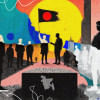
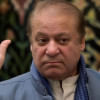
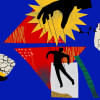

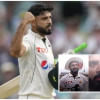

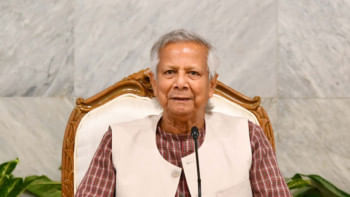
Comments